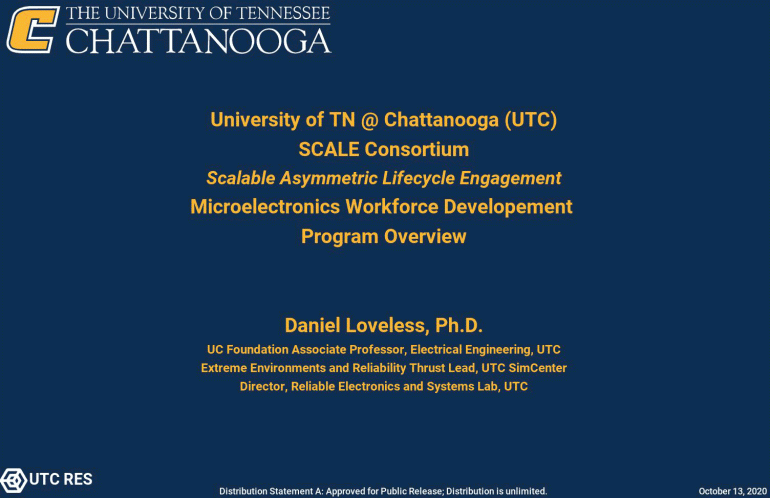SCALE (Scalable Asymmetric Lifecycle Engagement)

Purdue University and its university partners, including the University of Tennessee-Chattanooga, are executing a sustainable Microelectronics Workforce Public-Private-Academic Partnership (PPAP) prototype model, and CECS students are invited to join the program!
- Program information and goals
-
A single prototype process will be developed that applies across multiple microelectronic technology focus areas and multiple universities for scalability and replicability. Other key components will include a suite of efforts to attract students to DOD-relevant focus areas in microelectronics; nationwide curricular standards aligned with priorities driven by the Government Oversight Committee; and collaborative research to advance knowledge share. This project will allow us to develop, obtain, and maintain a knowledgeable microelectronics workforce for the defense microelectronics eco-system by introducing and implementing an innovative design-based engineering education methodology for metric-driven validation. The program will result in a specific yet adaptive ecosystem that will help increase the number of technically excellent, mission-driven students joining the defense microelectronics workforce. The prototype model will be initially developed to address two microelectronics focus areas: radiation hardened technology and heterogeneous integration/advanced packaging.
Through this multi-year effort UTC has joined forces with more than 70 public-private partners, including universities, government agencies and organizations, and industry affiliates. Please visit the SCALE Partners list on the Purdue University website for more details.
Resources:
- Overview of the SCALE program: https://research.purdue.edu/scale/index.php
- SCALE Job Board Link: https://scale.research.purdue.edu/
- SCALE Positions Web Help Manual: DOWNLOAD
- C2LC (Curriculum to Leading Career Pilot) Registration Flyer: DOWNLOAD
The Curriculum to Leading Career (C2LC) pilot is a short-term course designed to develop a clearable, knowledgeable microelectronics workforce to support and execute Air Force (and the larger DoD and Defense Industrial Base by extension) workforce modernization needs. The goal of C2LC is to familiarize students with the Department of Defense and how working for DoD can be a rewarding career. There may be an opportunity to gain an active Interim Secret security clearance to accelerate onboarding and engage employees in meaningful work sooner. Registration is free but limited to about 25-30 students. The sessions will start on Feb. 22. You can register directly through the link on the flyer by February 15, 2024.
- Technical Areas: https://research.purdue.edu/scale/technical-areas/index.php
- Presentation by Dr. Loveless on the SCALE program: https://www.seemapld.org/archive/2022/17_MAY_TUE/0830_C1-Loveless.pdf
Application Process
SCALE at UTC will provide mentoring, internship matching and targeted research projects for college students interested in one of the five technical areas within the program: radiation-hardening, system-on-chip, heterogeneous integration/advanced packaging, embedded systems/AI, and supply chain awareness.
If you are interested in participating in this program this academic year and applying to an internship or full-time position with an industry affiliate, please use the registration link below to submit your application and then send an email to Dr. Donald Reising SCALE's recruitment team will collect your background and interests and match you with government and industry internship opportunities. This match will ensure you receive the best fit for an internship to begin a successful career with effective mentoring in microelectronics.
Applications are accepted at any time during the year, but internships are limited. Students must be U.S. citizens to be eligible for funds.
Step Two: Contact Dr. Reising to Finalize Application
More Information
Guerry and UC Foundation Associate Professor
University of TN at Chattanooga
